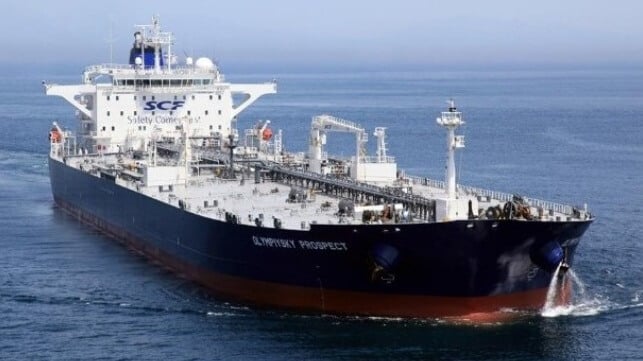Report: Sovcomflot is Renaming and Transferring Flags on More Tankers

Russian shipping company Sovcomflot has reportedly resumed the practice of shuffling around sanctioned tankers in an effort to protect the business. According to a new analysis by Bloomberg, at least four of the tankers have changed names and flags as part of the effort after the recent U.S. sanctions in the enforcement effort of the G7 Price Cap on Russian oil. Sovcomflot has regularly used overseas holding companies that make it difficult to track its fleet.
The report highlights that vessels are swapping flags some going international and others going into the Russian registry all to keep the oil flowing. Analysts have said that Russia is trying to keep the oil on its ships to earn the freight monies. Sovcomflot management had noted while reporting its year-end financial results that the sanctions were complicating the business. Reuters quoted Sovcomflot CEO Igor Tonkovidov as saying that the sanctions were "limiting our geography and commercial prospects."
The U.S. Treasury Department began in late 2023 imposing sanctions and listing vessels that were regularly breaking the price cap. The effort also cited ship managers in locations such as Dubai known to be working with Sovcomflot and then in February directly listed the Russian shipping company. Bloomberg calculates that a total of 21 Sovcomflot tankers have been designated including the 14 named in February.
The Bloomberg report cites transfers between the Russian flag and Gabon as well as ships moved into the Russian registry. For example, four tankers, Kemerovo (109,900 dwt), Belgorod (156,700 dwt), Kaliningrad (110,000 dwt), and Krasnoyarsk (109,800 dwt) can be seen in databases swapping between the two flags. They are using alternate names of Columbus, Bravo, Captain, and Creation while registered in Gabon. The vessels were built between 2006 and 2010. Lloyd's List reports Gabon also moved to deflag sanctioned Russian tankers.
Data also shows a strong increase in tonnage for the registry in Gabon. Clarksons highlights that Sovcomflot remains the largest owner of Aframax tankers but the rankings chart shows tonnage registered in Gasbon went from just over 1 million in 2022 to 3 million in 2023 and as of April 1, 2024, is now at 7.4 million GT. They report the number of vessels registered in Gabon has gone from 126 in 2023 to 217 as of April.

that matters most
Get the latest maritime news delivered to your inbox daily.
After the sanction effort began there were reports that Russian tankers had stropped trips and that India’s refineries, one of the biggest customers were reported pausing shipping on Russian vessels. India’s refineries however have resumed receiving the Russian oil. A report surfaced yesterday that one of the prominent P&I Clubs, International Group, told the British Parliament that the G7 Price Cap has become unenforceable.
Despite the efforts to increase the pressure with the sanctions, Sovcomflot reported for 2023 its net income was just short of $1 billion up by a third. Tonkovidov told reporters that only eight percent of the fleet transporting Russian oil was under the sanctions. Much of the effort has hit at the shadow fleet which consists of older, marginal vessels beyond the Sovcomflot fleet.
